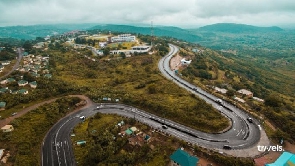 A bird's eye view of the Aburi area
A bird's eye view of the Aburi area
The hospitality industry in Aburi in the Akuapem South Municipality in the Eastern Region may soon lose its competitive advantage over Accra if the developers continue to cut down trees in the area.
Aburi has in recent times played host to many events as most organisers were shifting to the area due to the serene atmosphere and its ambiance and also due to the heat in the capital, Accra.
However, the town is gradually losing this advantage as more building are springing up in areas that used to bear trees thus losing its lustre and serenity.
Concerns
Participants at a conference at Hephziba Christian Centre in Aburi, told us in an interview that the spate of rapid development taking place in the area, may be counterproductive to the advantage area has over Accra.
According to them, if Aburi loses it greenery and serene atmosphere, “there would not be the need for people to travel all the way from Accra to Aburi to experience the same environment as Accra.”
There is a call on nations to protect the environment and plant more trees to combat climate change.
According to the United Nations Framework Convention on Climate Change (UNFCCC), climate change “means a change of climate which is attributed directly or indirectly to human activity that alters the composition of the global atmosphere and which is in the addition to natural climate variability observed over a comparable time periods.”
Danger
A participant from Abofour, near Offinso in the Ashanti Region, John Kwasi Baffour believed that the rate of development in the area could have serious effects on the weather in future.
Mr Baffour, who seemed to have lot of knowledge about climate change, said there was the need to maintain the forest and stop cutting down on trees to pave way for development.
He said even building on the slope of the mountain could pose a challenge to the integrity of the structure.
By-laws
When contacted, the Municipal Chief Executive of Akuapem South, Frank Aidoo, said the assembly has by-laws preventing people from putting up buildings in certain areas to protect the serenity of the place and also the environment.
He said the assembly has been enforcing these laws and those who undertake development on the blind side of the assembly “are severely punished for flouting the laws.”
“We do not intend to lose the advantage we have and we will do all to protect the environment and promote tourism in the area,” he said.
Experiences
Sharing their experience and knowledge on climate change, Akosua Ampomah, a resident of Elmina in the Central Region, attending a workshop at the centre, said “I have heard a lot about climate change but cannot pinpoint exactly what it is.
“I heard that activities of illegal miners cause lot of damage to the environment which tend to affect the climate but the how, I don't know,” she said.
She, however, admitted that the weather in Aburi was much cooler and friendly than that of Elmina.
“In Elmina, you cannot sleep in the room in the afternoon even though it is a coastal town. But here, the trees provide fresh air which makes the atmosphere very serene,” she said.
For his part, Kwabena Asare, from Ho in the Volta Region, “I know climate change is caused by fumes from vehicle and factories and this has changed the weather pattern in most part of the world including Ghana.”
Coming from a town close to forest and mountains, he still found the weather in Aburi more accommodating than the one from where he came from.
He believed that the trees and the location of the centre on top of the mountain could be the reason for the nice weather.
Call
The interviewees called on stakeholders to increase the level of awareness among the populace on the need to protect the environment and guard against acts that could have adverse effects on the climate.
They believed that if people were educated on the dangers their acts or inactions could cause to the environment, they would be more willing to stop them.
Action
Ghana in recent times started to prioritise mitigation and adaptation of climate change; individuals and organisations now plant more trees than before.
The government as part of efforts to combat the phenomenon, birthed the Green Ghana agenda, where Ghanaians plant millions of trees each year.
In 2022, the country planted some 20 million seedlings across the country.
Also, Ghana, this year, received over $4.8 million from the World Bank's Forest Carbon Partnership Facility for reducing carbon emissions in the forest landscape.